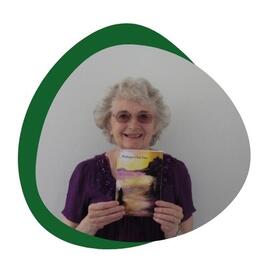Jenni Wyn Hyatt
Published Books
Perhaps One Day (May 17) BUY ON AMAZON = https://amzn.to/3sQmgQw
Who are you? Tell us a little about yourself...
I was born in Maesteg in 1942. I wrote poetry until I was sixteen then gave up, thinking I wasn’t good enough. I began again when I was sixty-eight, after a couple of visits to WWI sites in France seemed to demand a poetic response, and I have been writing poetry ever since. I live in Derbyshire with my husband, Pete, and my black and white cat, Mabon. I belong to two poetry groups, enjoy reading, writing, gardening, bird-watching, short walks and holidays in our motorhome.
What first inspired you to start writing?
English was my favourite subject in school and poetry was my favourite part of it. Visiting WWI sites in France was one of our hobbies and that’s where the ‘Muse’ found me again. I am also inspired by memories of my childhood, Wales, my family, pets past and present, and nature. Some of my poems deal with poverty, xenophobia and injustice and, in contrast, I also write humorous poems.
What made you want to work with Rowanvale and be published?
One of my daughters felt my poetry was good enough to publish; a friend suggested Rowanvale and, when I investigated, and found it was based in Cardiff, it seemed the right choice for me.
When you're not writing, what are you reading?
Oh gosh, anything and everything in both English and Welsh! I am currently reading a book about prisoners of the Japanese in WWII and concurrently a book of poetry, ‘Cymru mewn 50 Cerdd’ (Wales in 50 Poems). Well-written novels that feature Wales and or nature tend to appeal to me and I also read a huge amount of detective fiction.
Which work are you most proud of?
I have published two collections of poetry, ‘Perhaps One Day’ (2017) and ‘Striped Scarves and Coal Dust’ (2019). I’m not sure that you’d call the piece I am most proud of a ‘work’; it’s a poem of the form known as a pantoum. It’s entitled ‘Refugee’ and appears on page 46 of ‘Perhaps One Day’. In the poem, I adopt the voice of a female Syrian refugee and plead her case against rejection and racism. It was published and won an award in the prestigious US magazine, ‘The Lyric’.
What's your best advice for handling writer's block?
Oh my goodness, what a question! Unfortunately, it happens horribly often and, each time, I feel I’ll never write again. My ‘remedies’ include writing about it humorously, which I’ve done several times, translating poems from Welsh to English, reading poetry, doing exercises that aim to stimulate the right (creative) side of the brain, going for walk on my own and just riding it out!
What's one thing you always have with you when writing?
My phone – but I always have it with me anyway! In the early days, I used always to have a rhyming dictionary and a thesaurus, but my phone incorporates both those – and a ‘notepad’.
What is the one book you would take with you if you were stuck on a desert island?
This is really, really difficult. I think it might have to be ‘The Poems of Rupert Brooke’, which a penfriend bought me for my fourteenth birthday, or a good 20th century anthology of verse.
What is the best part about being an independently published author?
Having control over one’s own work, I guess, and not having to be at the beck and call of a publisher.
What's next for you?
I am looking forward to the imminent publication of a modern rendition of the ode which won the Chair in the 1917 National Eisteddfod of Wales, after its writer -- the poet Hedd Wyn -- had been killed at the Battel of Passchendaele. I provided the poet, Michael Dante, with a full literal translation of the ode and also translated some of Hedd Wyn's short poems for the book. I would also love to publish (when I have a large enough collection) my own translations into English of a number of well-known Welsh poems, and, just maybe, perhaps one day, another full collections of English poems. Who knows?
Perhaps One Day (May 17) BUY ON AMAZON = https://amzn.to/3sQmgQw
Who are you? Tell us a little about yourself...
I was born in Maesteg in 1942. I wrote poetry until I was sixteen then gave up, thinking I wasn’t good enough. I began again when I was sixty-eight, after a couple of visits to WWI sites in France seemed to demand a poetic response, and I have been writing poetry ever since. I live in Derbyshire with my husband, Pete, and my black and white cat, Mabon. I belong to two poetry groups, enjoy reading, writing, gardening, bird-watching, short walks and holidays in our motorhome.
What first inspired you to start writing?
English was my favourite subject in school and poetry was my favourite part of it. Visiting WWI sites in France was one of our hobbies and that’s where the ‘Muse’ found me again. I am also inspired by memories of my childhood, Wales, my family, pets past and present, and nature. Some of my poems deal with poverty, xenophobia and injustice and, in contrast, I also write humorous poems.
What made you want to work with Rowanvale and be published?
One of my daughters felt my poetry was good enough to publish; a friend suggested Rowanvale and, when I investigated, and found it was based in Cardiff, it seemed the right choice for me.
When you're not writing, what are you reading?
Oh gosh, anything and everything in both English and Welsh! I am currently reading a book about prisoners of the Japanese in WWII and concurrently a book of poetry, ‘Cymru mewn 50 Cerdd’ (Wales in 50 Poems). Well-written novels that feature Wales and or nature tend to appeal to me and I also read a huge amount of detective fiction.
Which work are you most proud of?
I have published two collections of poetry, ‘Perhaps One Day’ (2017) and ‘Striped Scarves and Coal Dust’ (2019). I’m not sure that you’d call the piece I am most proud of a ‘work’; it’s a poem of the form known as a pantoum. It’s entitled ‘Refugee’ and appears on page 46 of ‘Perhaps One Day’. In the poem, I adopt the voice of a female Syrian refugee and plead her case against rejection and racism. It was published and won an award in the prestigious US magazine, ‘The Lyric’.
What's your best advice for handling writer's block?
Oh my goodness, what a question! Unfortunately, it happens horribly often and, each time, I feel I’ll never write again. My ‘remedies’ include writing about it humorously, which I’ve done several times, translating poems from Welsh to English, reading poetry, doing exercises that aim to stimulate the right (creative) side of the brain, going for walk on my own and just riding it out!
What's one thing you always have with you when writing?
My phone – but I always have it with me anyway! In the early days, I used always to have a rhyming dictionary and a thesaurus, but my phone incorporates both those – and a ‘notepad’.
What is the one book you would take with you if you were stuck on a desert island?
This is really, really difficult. I think it might have to be ‘The Poems of Rupert Brooke’, which a penfriend bought me for my fourteenth birthday, or a good 20th century anthology of verse.
What is the best part about being an independently published author?
Having control over one’s own work, I guess, and not having to be at the beck and call of a publisher.
What's next for you?
I am looking forward to the imminent publication of a modern rendition of the ode which won the Chair in the 1917 National Eisteddfod of Wales, after its writer -- the poet Hedd Wyn -- had been killed at the Battel of Passchendaele. I provided the poet, Michael Dante, with a full literal translation of the ode and also translated some of Hedd Wyn's short poems for the book. I would also love to publish (when I have a large enough collection) my own translations into English of a number of well-known Welsh poems, and, just maybe, perhaps one day, another full collections of English poems. Who knows?



